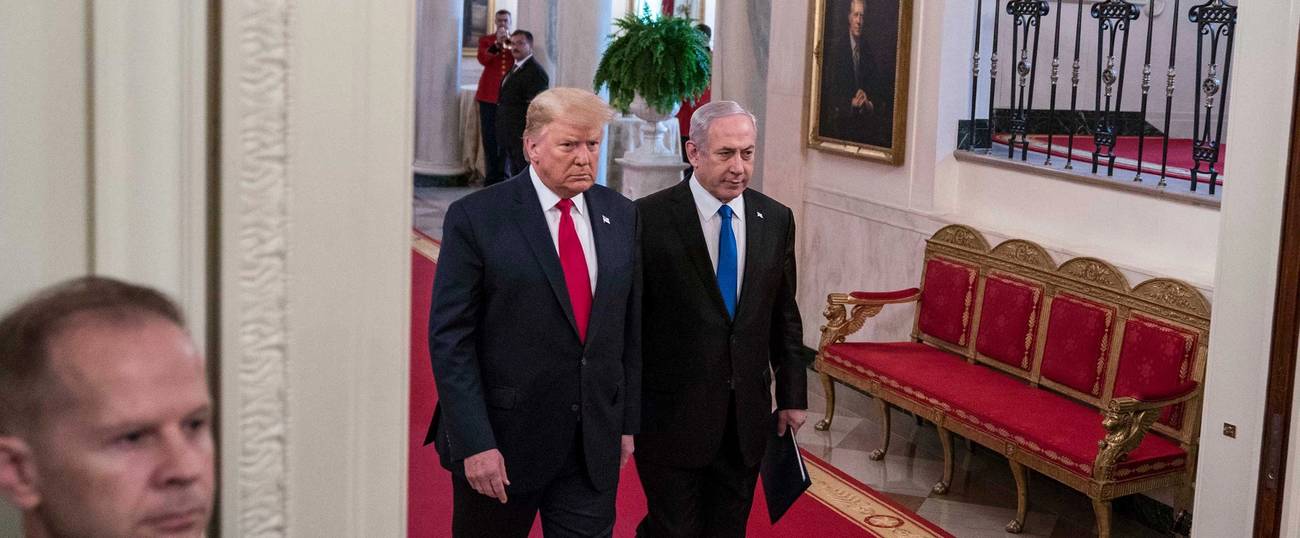A Middle Eastern Fairy Tale Unfolds at the White House
Donald Trump has a talent for pointing out that the Washington smart set isn’t wearing any clothes




There’ll be time enough, in the days and weeks to come, to parse the fineries of President Trump’s so-called Deal of the Century. For now, though, one thing must be said: The plan introduces an element that’s been sorely missing from Washington’s approach to the Middle East for at least two decades—reality.
Talk to any of our best and brightest diplomats, analysts, and pundits, and you may be forgiven for thinking the region was reached not by plane but by wardrobe. Like a sandy Narnia, the land imagined in Foggy Bottom was one governed not by people and interests but by concepts and frameworks, best understood not by hitting the ground but by visiting the Council on Foreign Relations.
That is why the Clinton Parameters, which would’ve given the Palestinians the vast majority of the West Bank and the entirety of the Gaza Strip, lived on long after they were rejected, in December of 2000, by Yasser Arafat. Condoleeza Rice, who soon took over Foggy Bottom, worked assiduously to resurrect the agreement, and Barack Obama conjured it any time he needed a specter with which to haunt Israel into submission. It mattered not a lick that the Palestinians continued to reject this last, best shot at keeping the Oslo Accords alive. It moved no one that the Palestinian Authority continued to accept vast sums in foreign aid, much of which was funneled to reward terrorists for murdering Jews. And no one cared that each Palestinian no—delivered to Barak at Camp David and to Olmert in Jerusalem—was met by an American shrug and a promise to work harder to appease the region’s ever obdurate child. This is the kind of logic bred by fantasists: the belief that no matter how people behave here on earth, some big and mystical breakthrough is forever just around the corner.
As those paying attention to reality know by now, no breakthrough was forthcoming. Israel plodded on imperfectly, Mahmoud Abbas continued his predecessor’s stubborn headshake, and Washington continued to talk haughtily about the cycle of violence and about the settlements being the real obstacle to peace and about the need for both sides to make painful sacrifices.
Enter Donald Trump.
You may resent the president and dwell on his many shortcomings. You may admire him for a number of his finer qualities. But one thing is now evident: Like the small child in the tale of “The Emperor’s New Clothes,” Trump has an impressive ability, at least when it comes to the Middle East, to point out and ridicule the preposterous pieties his predecessors considered sacrosanct.
When confronted with the myth of Palestinian refugees, for example—Palestinians being the only people in history for whom the condition of statelessness is hereditary and observed rigidly even as new generations strike roots elsewhere—Trump slashed support for UNRWA, the United Nations’ agency devoted to perpetuate this outrage. He moved the American Embassy to Jerusalem, doing in deed what a long line of American politicians promised and failed to deliver. He recognized Israel’s sovereignty over the Golan Heights. And now, perhaps most meaningfully, he put to rest the lifeless notion that the 1967 borders—the so-called Green Line—were the sine qua non of any and all future negotiations.
What these decisions have in common isn’t just the ability, not always in ample supply in Washington, to see Israel’s point of view. They also share a refreshing ability to observe reality coolly and without too many preconceived notions. Any intelligent and impartial observer of this conflict—as opposed to the politruks on the Potomac—would’ve long ago realized that insisting on a framework that has been rejected for 20 years straight was folly, and that it was far more constructive to acknowledge that actions have consequences; that decades of declining offers came at a price; and that, given the circumstances, a new deal should begin by affirming conditions on the ground and proceeding from there.
And conditions on the ground, to be sure, are far better than what the quivering chorus of Palestinian apologists would have you believe. Under Trump’s deal, the Palestinians get nowhere near what Clinton had offered them a few weeks before leaving office, but they do get more than double the territory they currently control, complete with a generous payday that should enable them to achieve their lasting dream of declaring independence. It’s why Egypt, Saudi Arabia, the UAE, and Britain all came out in support of the deal. It’s also why the Palestinians, keeping up with tradition, rejected it before hearing it, with Abbas going on to call the American president a dog and a son of a dog.
As Trump understands fully well, name-calling and head-shaking are the acts of petulant toddlers, not serious adults ready to accept responsibility for their own destiny. He also knows that much of what he said today—that Oslo is dead, that Israel must annex the Jordan Valley, that the Jews of Judea and Samaria should never feel like second-class citizens—should’ve been said, long ago and forcefully, by an Israeli prime minister, one mindful of his nation’s needs and unafraid of ephemera like cutting op-eds in the liberal Western press or slaps on the wrist at the U.N. Security Council. And now this new offer, imperfect as it may yet prove to be, is on the table, bolstered by a president who, for the first time in decades, sees the Middle East for what it truly is.
***
Like this article? Sign up for our Daily Digest to get Tablet magazine’s new content in your inbox each morning.
Liel Leibovitz is editor-at-large for Tablet Magazine and a host of its weekly culture podcast Unorthodox and daily Talmud podcast Take One. He is the editor of Zionism: The Tablet Guide.